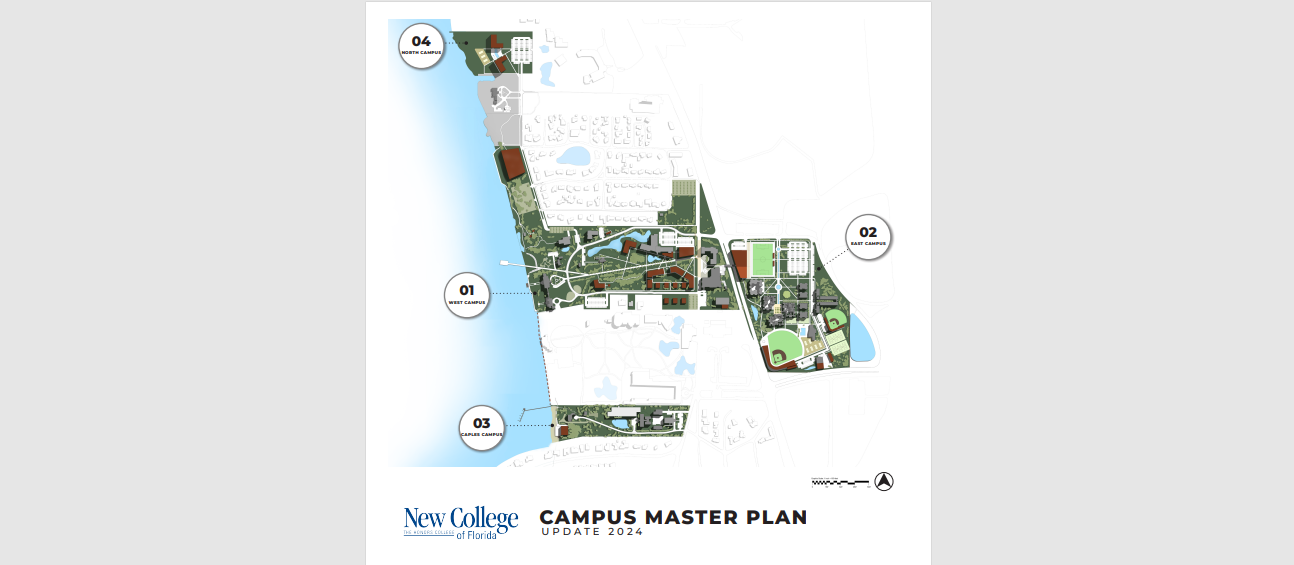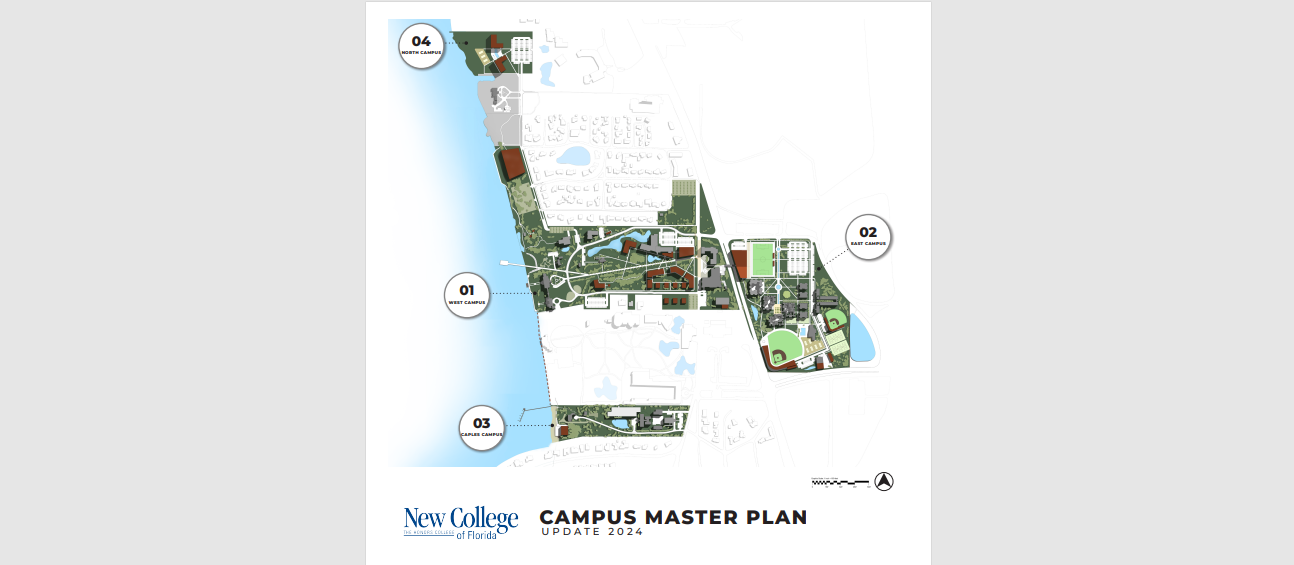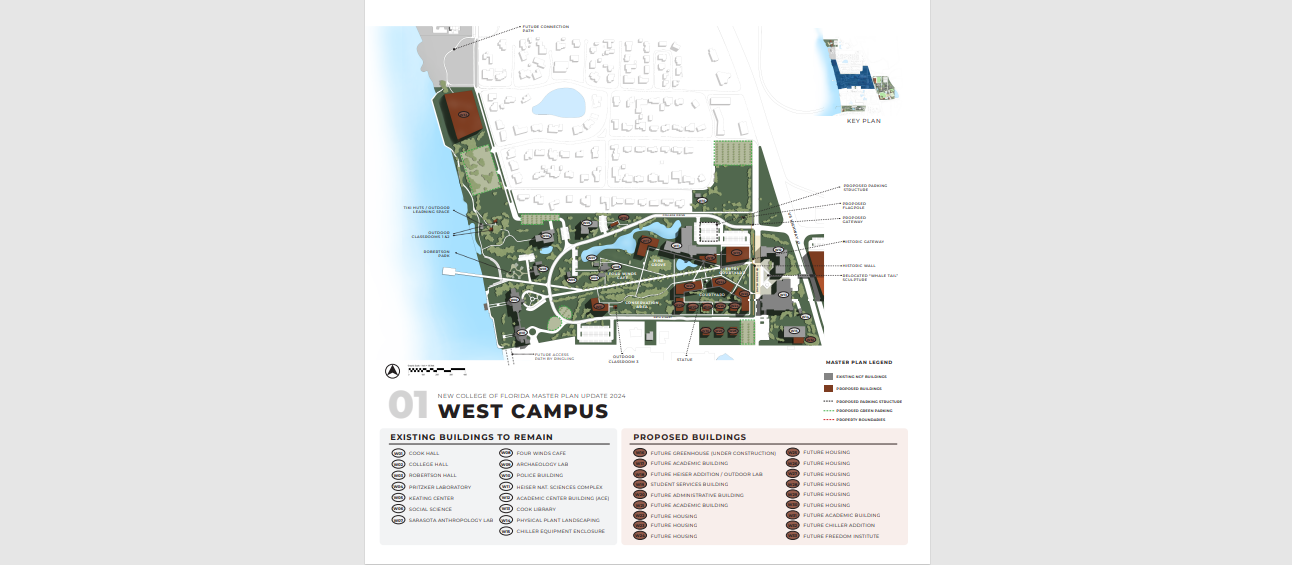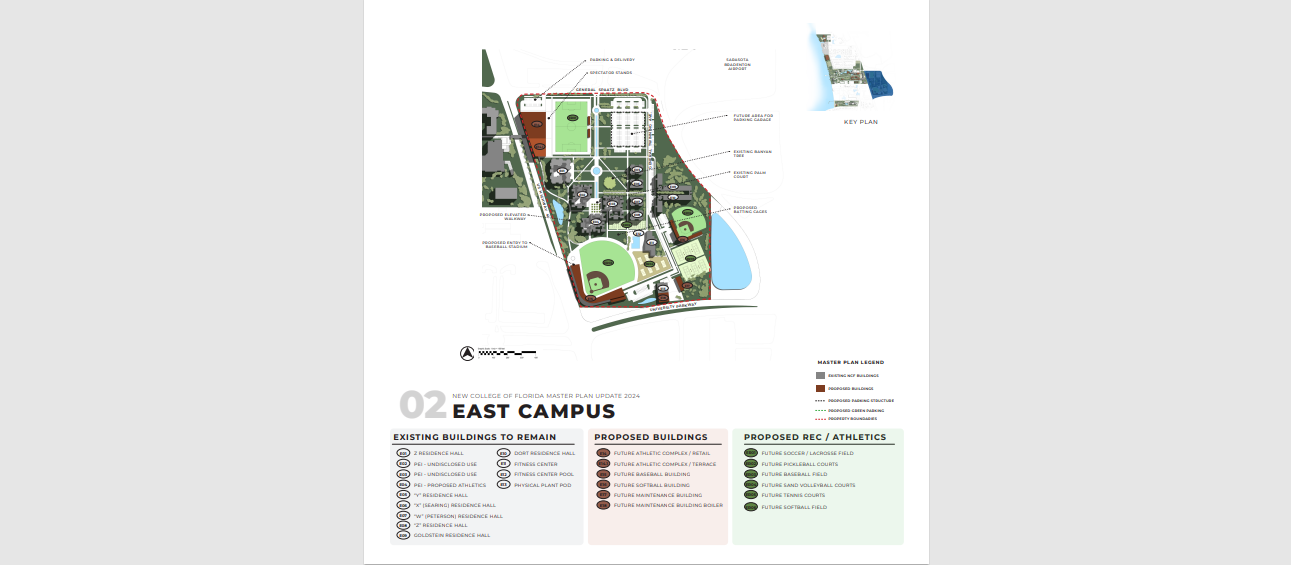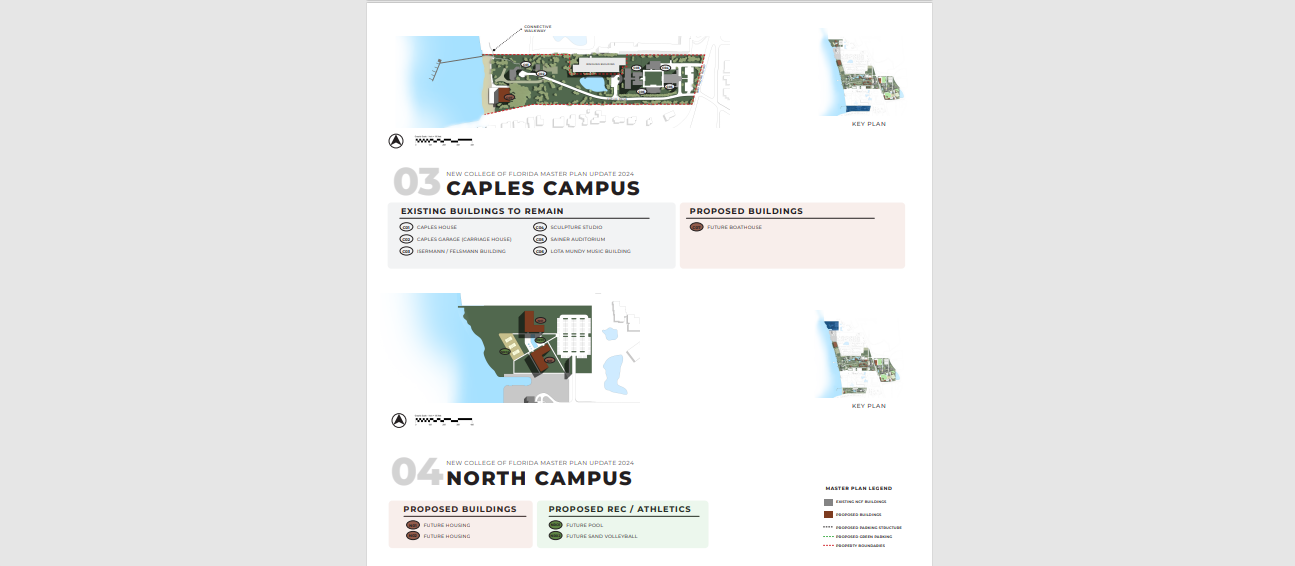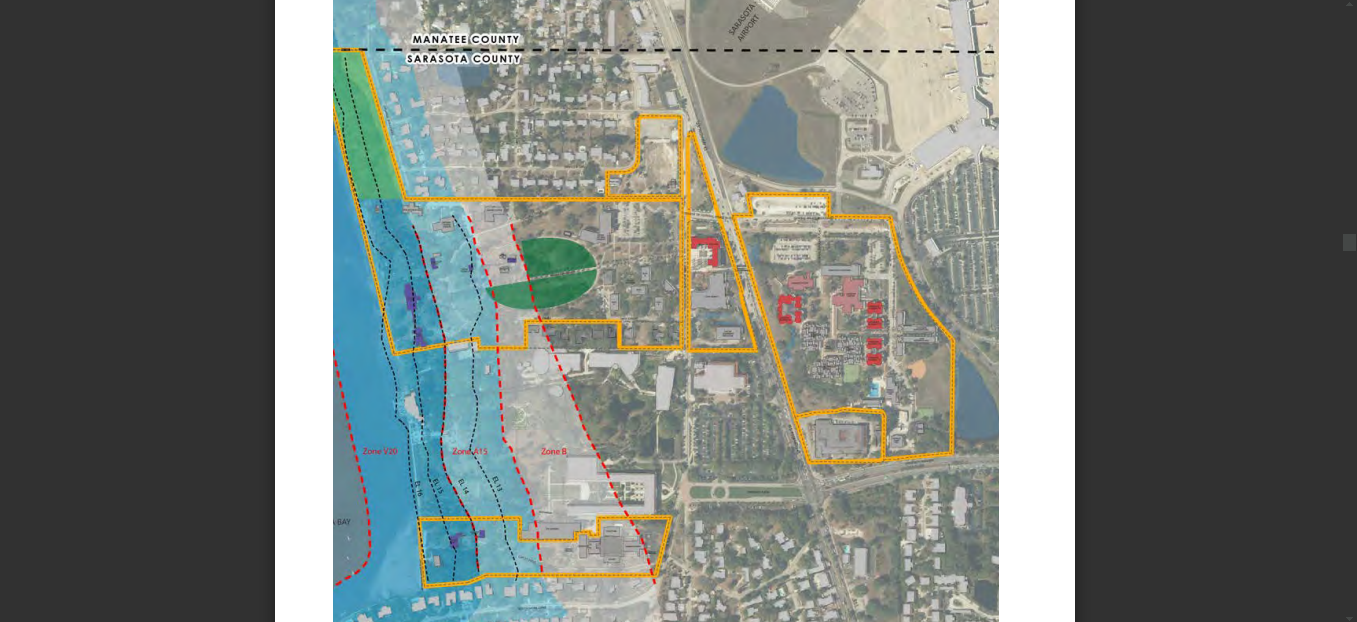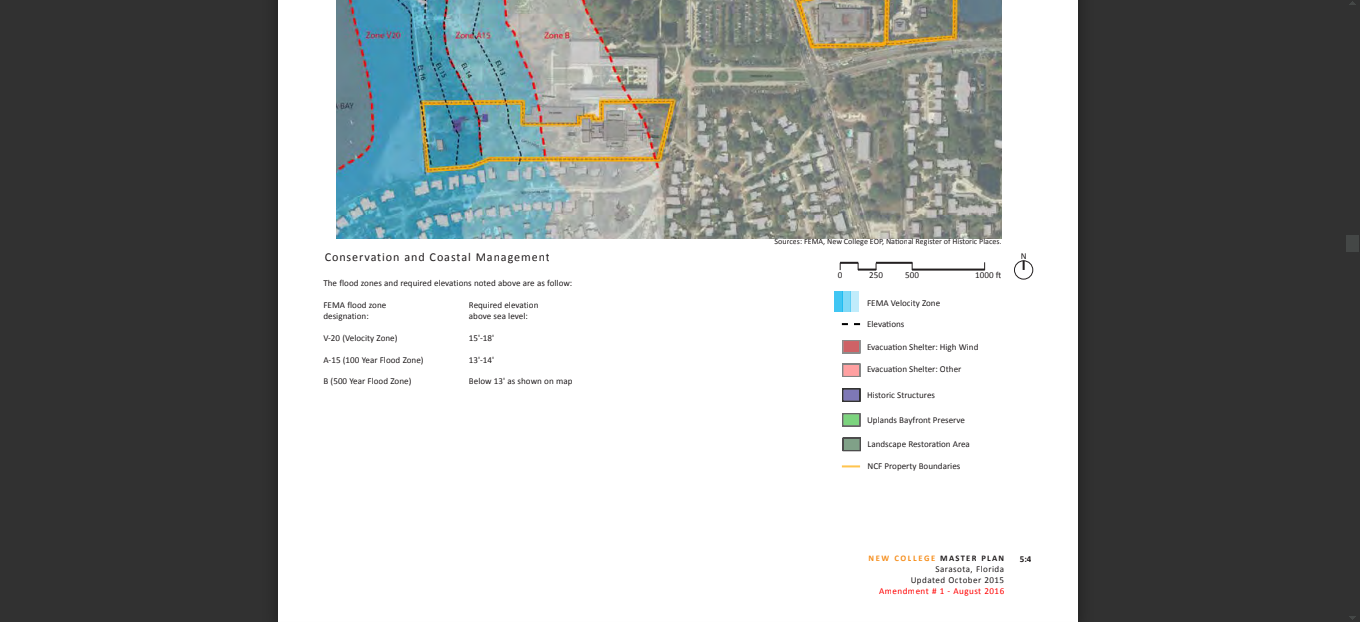On Jan. 22, the New College of Florida Board of Trustees (BOT) presented an updated Campus Master Plan that featured a proposed baseball stadium, housing for students north of the Powel Crosley Estate and the installation of a building referred to as the “Freedom Institute.” But members of the Uplands Neighborhood Association have voiced concerns regarding the plan, criticizing what they see as a lack of research and collaboration.
The Uplands is a residential neighborhood located north of the New College bayfront campus. The neighborhood was established in the 1940s and it has maintained a longstanding relationship with New College since the campus opened in 1960. The community currently contains 110 houses with a spring-fed lake in the middle of the neighborhood. This small neighborhood is known for its array of native birds, making it an ideal location for bird watching.
The implementation of buildings such as the “Freedom Institute” has the potential to disrupt the peace of this quaint neighborhood. The proposed structure will be a potential conference center and academic building with a “green” parking lot to the south. This building will run alongside the bayfront, taking up approximately 75,000 square feet of space, based on the rendering of the Master Plan and determined by the length and width of the footprint.
Within the updated proposal is a northern addition to the New College campus. This nine-acre parcel of land north of the Crosley Estate will contain student housing and a parking structure. .
The implementation of these proposals will ultimately require a road to be built through the Uplands Neighborhood in order to accommodate the increased traffic. Along with this will come an array of environmental questions.
The Catalyst spoke with two residents of the Uplands Neighborhood Association, Karen Stack and Judy Burns (‘81), regarding their concerns about the proposed Master Plan.
One concern is what they regard as a failure to collaborate with the Neighborhood Association regarding the implementation of the proposed buildings. When the current Master Plan was implemented in August 2016, the Association was on the planning committee to provide its input on the proposed updates. However, Stack and Burns said the BOT’s actions have suggested that Uplands will not be receiving a seat at the table this time around
“In past master plans, the process has been to involve more of the staff, administration, neighborhoods. And there is a history of New College and neighborhoods and more stakeholders being involved in the Master Plan process,” Burns stated.
“Sadly, the New College administration has not been open to allowing this neighborhood to engage with what the plans are and how they’ll impact us and how to mitigate some of those concerns. It’s basically been a very quiet process,” Stack added.
Burns said she reached out to New College following her observations of construction happening near Poinciana Drive. She was put in contact with President Richard Corcoran and met with him to discuss the proposed business plan.
“We were aware of this plan, it wasn’t all fleshed out like this, back in August because they put out a business plan. This Master Plan is part of a business plan,” Burns explained. However, despite her meeting with Corcoran, Burns said she felt as though her voice was not being heard. “What we want is not to just have documents shared with us … It’s to be part of the collaborative process.”
An informational meeting was held on Dec. 8, 2023 to discuss the potential changes to the Master Plan from 2016, allowing input from the community. However, the renderings of the proposed Master Plan had yet to be released. On Jan. 22, New College hosted the first public hearing. Approximately 140 community members were in attendance when the renderings of the new Campus Master Plan were presented.
“Nobody had seen this plan. We were allowed to give public input during that meeting, but there was no possibility of giving well-thought-out input when you had no idea what this plan was about. … This hardly qualifies as a public hearing where you had a chance to have well-thought-out input,” Burns observed.
According to Florida Statute 1013.30, if an amendment to a Campus Master Plan “increase[s] density or intensity of use of land on the campus by more than 10 percent” the Master Plan must undergo review from multiple state agencies. These agencies are given 90 days to review the plan and provide feedback. The statute also requires there to be two public hearings before the master plan can be adopted.
Burns and Stack argued that the changes made to the current Master Plan exceed the 10 percent allowed by the Florida State Government without review.
“They kept referring to the process as that they were embarking on as small changes to the Master Plan that is currently in place,” Stack explained, “When there’s this amount of change proposed, there’s supposed to be a body of research that’s done ahead of time. … That seems to have been lost.”
The women have also raised concerns regarding the environmental impact the proposed changes will have on the community. The building of the Freedom Institute and its respective parking lot will result in an increase of light and noise pollution, ultimately impacting the natural wildlife species that have found a home within the community. The building will also be situated where a natural stream currently exists. This creek drains into the Sarasota Bay from the spring-fed lake in the community.
“Look around at the environmental impacts, the city impacts, how it’s going to impact the neighbors, the environment and the water, the roads and transportation. And pretty much all of that was bypassed by the current administration,” Stack explained.
“It’s not about not sharing it. We understand that you can share a resource. Don’t take it away. It is way too important of an open space. It’s crazy to think that it would be taken away,” Burns said.
Within the current 2016 Master Plan, the parcel of land where the proposed Freedom Institute would reside is referred to as the Uplands Bayfront Preserve. Chapter 5 of the 2016 Master Plan identifies the different objectives on campus. One component is Conservation/Preservation. This is where the Uplands Preserve is listed.
According to the 2016 Master Plan, “The Uplands Bayfront Preserve is open space for passive recreational and preservation purposes potentially providing opportunities for research. Trails and outdoor classroom activities may occur in this space.”
Burns emphasized the economics behind this endeavor. “What are the funding mechanisms for these campus plans? If the state owns this property, it means that if some of these changes take place, there is taxpayer money that will fund this, and if something like this were to occur on the bayfront, millions of dollars…. Who is really looking at these issues? There are economic issues related to who’s funding it.”
Burns also mentioned that the proposed Freedom Institute would be built in a Federal Emergency Management Agency (FEMA) VE Flood Zone. FEMA defines this as, “Coast flood zone with velocity hazard (wave action).”
Despite their communication with Corcoran and New College, Burns and Stack have questions that remain unanswered. Burns requested and received from Associate Vice President of Physical Plant Itza Frisco a list of the reviewers responsible for commenting on the newly constructed Master Plan. Meanwhile, Stack received a list from the Jan. 22 meeting.. However, these lists had different names on them. Burns reached out to Corcoran to reconcile this matter but was instead put in contact with Frisco. She received the following document:
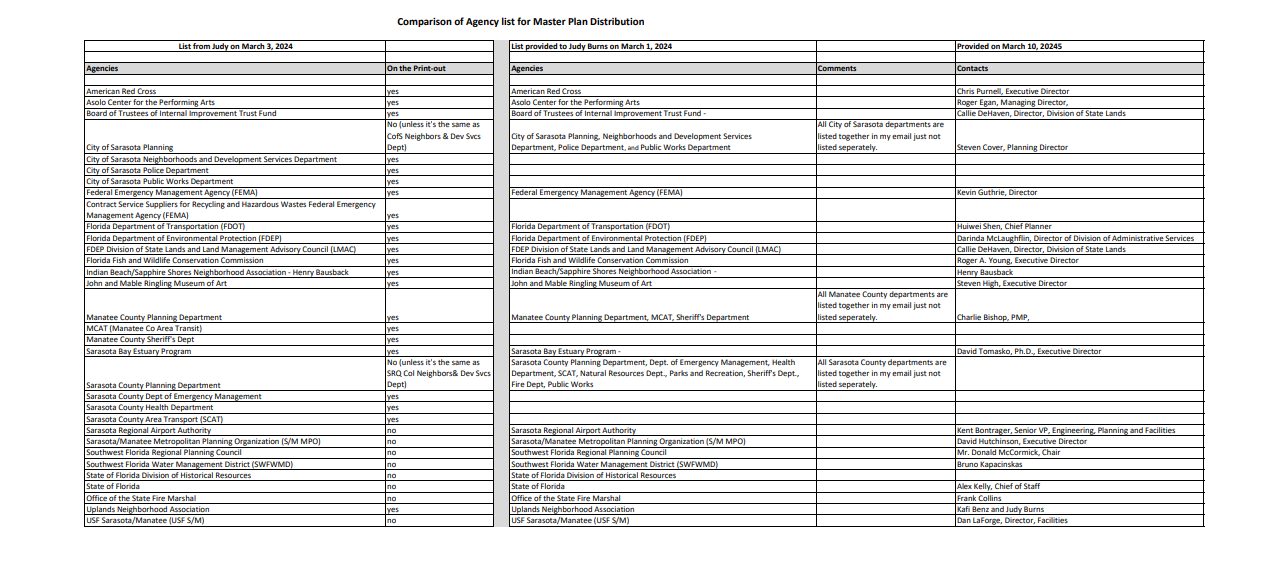
The new proposed Master Plan has been sent out for review. Reviewers have 90 days to make their comments regarding the document before it will be reviewed by the BOT and then sent to the Board of Governors (BOG).
New College also requested approximately $400 million to fund the Business and Master Plan. The Florida Legislative Session ended March 8, resulting in New College receiving $30 million. In an email from the President’s Office, Corcoran explained how these funds would be distributed: $10 million will go to recurring funds, half of which will go towards scholarships, $10 million for temporary student housing, $6.25 million for on-campus housing, $1 million for campus security and $2 million for various resources including technology upgrades and academic coaches. It is unclear how these funds will contribute to the implementation of the Business and Master Plan.
Burns and Stack emphasized their wish for their voices to be heard.
“If they want to grow a school, more power to the school. We really appreciate the fact that there is a school here. It’s culturally important to the community,” Stacks explained. “It’s not about the growth of the school, it’s how they’re growing it.”
“We do feel that we’re stakeholders and we deserve a seat at the table. We shouldn’t be dismissed as an annoyance and an obstacle to their Board progress,” Stacks stated.
“The outcome is not that we’re against New College, it’s that we want to be a part of the process,” Burns added. “We’ve always had a cordial relationship with New College.. We’re not in a battle, we’re not even in negotiations, we’re asking to be a part of the process.” And further, “Accountability matters. It’s a public institution, and being accountable to your stakeholders, to the Sarasota community, that’s really important”
The Catalyst reached out by email to President Corcoran on March 7 with a request for comment. No response was received by our publication date.

